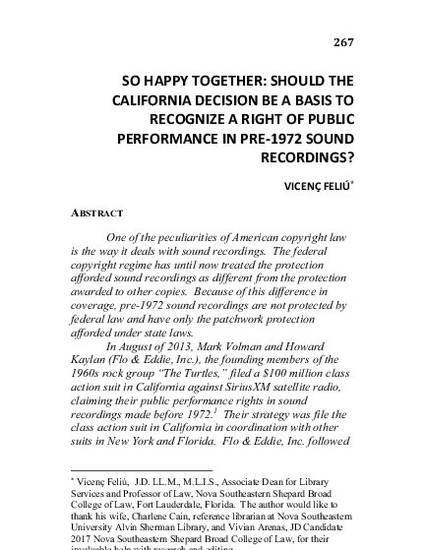
Article
So Happy Together: Should the California Decision be a Basis to Recognize a Right of Public Performance in Pre-1972 Sound Recordings?
IDEA - The Journal of the Franklin Pierce Center for IP
(2018)
Abstract
One of the peculiarities of American copyright law is the way it deals with sound recordings. The federal copyright regime treated sound recordings as different from the protection awarded other copies and, consequently, there are some gaps in protection coverage. Because of how federal protection developed, pre-1972 sound recordings are not protected by federal law and have only the patchwork protection afforded under state laws.
In August of 2013, Mark Volman and Howard Kaylan, the founding members of the 1960s rock group The Turtles, filed a $100 million class action suit in California, under the incorporated name Flo & Eddie, Inc., against SiriusXM satellite radio, claiming asserting their public performance rights in sound recordings made before 1972. They filed this class action suit in California in coordination with other suits in New York and Florida and followed with a suit in California against Pandora internet radio.
Satellite and internet radio stations transmit thousands of pre-1972 sound recordings on the understanding that §114 of the Copyright Act of 1976 gives them the protection to do so. That section of the Copyright Act carves out limitations on exclusive rights and outlines the way that compensation accrues to owners of recordings. In their complaint, Flo & Eddie contended that SiriusXM engaged in misappropriation, unfair competition and conversion that affected all members of the class action and that federal law, in its present form, cannot be relied upon for effective relief. In November of 2016, Flo & Eddie settled the California federal lawsuit over oldies royalties on the eve of trial.
This article seeks to examine the background of copyright law in the US leading to Flo & Eddie’s complaint. The article will focus on examining the specific situation covering protection of sound recording made prior to 15 February 1972 and look at the repercussions of the gap in federal coverage. It will also briefly examine the New York and Florida cases and the Pandora cases. Finally, it will return the California settlement and look at another author’s assertion of whether that case might be used as a springboard to create a federal scheme of protection for pre-1972 sound recordings.
Keywords
- copyright,
- intellectual property,
- ip,
- sound recordings,
- pre-1972,
- Flo & Eddie,
- public performance right
Disciplines
Publication Date
2018
Citation Information
Vicenç Feliú. "So Happy Together: Should the California Decision be a Basis to Recognize a Right of Public Performance in Pre-1972 Sound Recordings?" IDEA - The Journal of the Franklin Pierce Center for IP Vol. 58 Iss. 3 (2018) p. 267 ISSN: 0019-1272 Available at: http://works.bepress.com/feliu/12/
